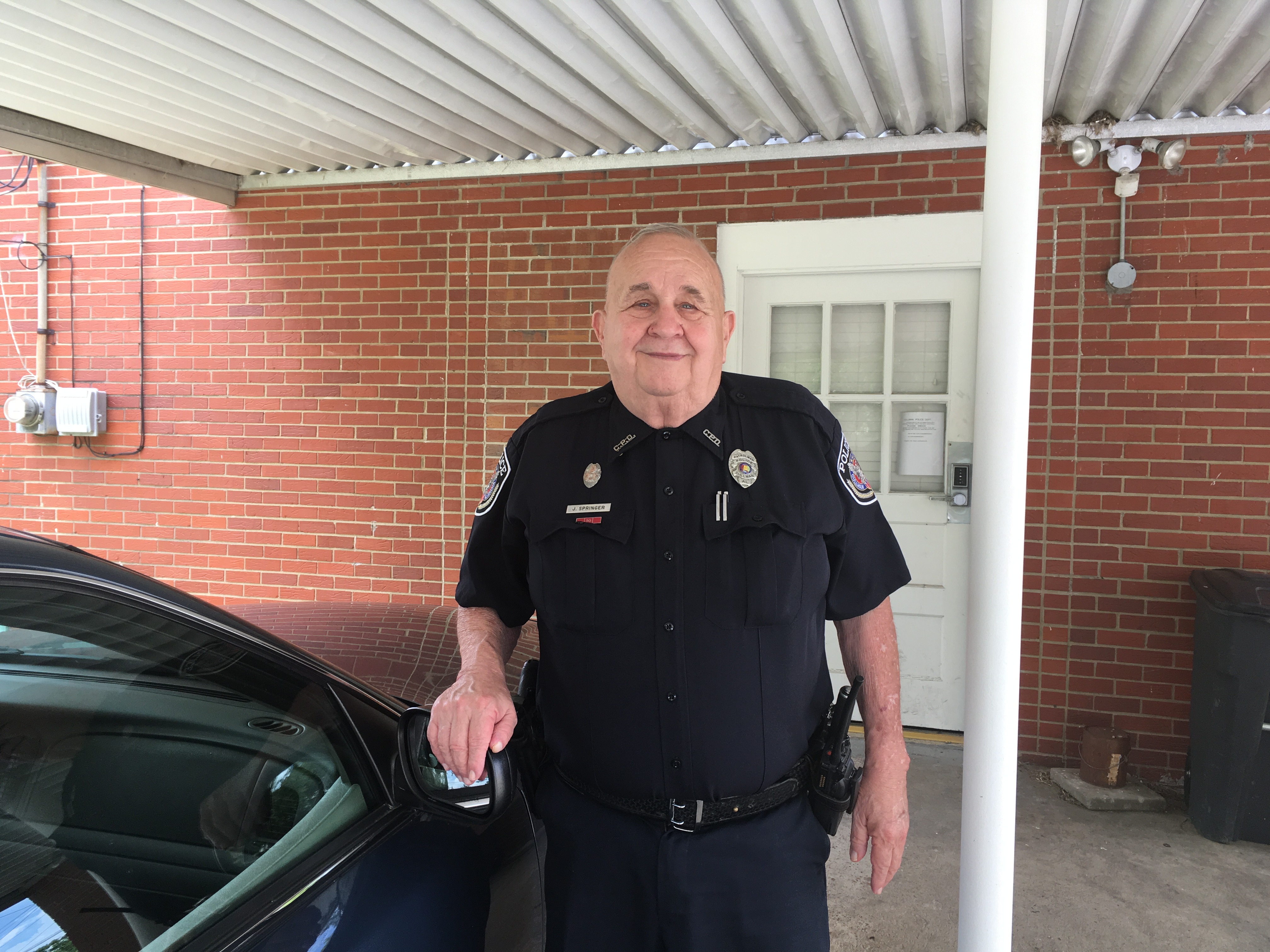Cullman Police Officer Jack Springer recently marked 50 years with the department. Springer, who has been married to his wife Shirley for more than 50 years, has two adult sons. The younger is a Birmingham police officer who is set to retire this fall. Springer plans to outlast him. (W.C. Mann for The Tribune)
CULLMAN – Cullman Police Department (CPD) Chief Kenny Culpepper and Reserve Officer Terry Heaton received custom made 40-year pins this year, for their service to the city since 1978. The insignia manufacturer had never received a request for a 40-year pin before. Now, for the second time this year, the company has had to come up with an entirely new pin design for a Cullman policeman: a 50-year pin.
Officer Jack Springer joined the CPD on June 1, 1968. Fifty years and a month later, The Tribune sat down with him in his office at the west precinct station to talk about his career.
Springer is a Cullman native, in his own words, “Born and raised. Only time I was ever gone was when I was in the military.”
After graduating from St. Bernard, he joined the Air Force for four years and served in assignments with Air Training Command and Security Services (Air Force Intelligence) in the U.S. and Turkey. Given an option to come home a few months before his enlistment officially ended, he returned to Cullman in 1964.
After a few years with the Cullman Power Board, Springer joined the CPD. He served as a full-time officer long enough to retire from the department, then returned as a part-time reserve officer.
On 50 years of law enforcement in Cullman
Springer shared, “When I first started, they didn’t do any paperwork. You arrested somebody, filled out a jail card, and put them in jail. Then, when Bascom Miller, the first chief I worked under, he left, Roy Wood came . . . He brought in the state stuff about arrest reports, I/O (incident/offense) reports, and all that we started filling out. And after that, it all went on computer.
“You know, it’s hard changing. You know, if you’ve done something a certain way for 10 years or more, then you change completely to something new, and then 10 or 15 or 20 years later you change to something completely new. If you’ve never done it, it’s hard to get adapted to it and get used to it.
“It’s changed a lot, and a lot of it hasn’t changed for the better; that’s just my opinion. You know, when they started all the PC stuff–20 years ago, you wouldn’t dare talk to a policeman like you do now. People had a lot more respect.
“I would like to see more respect for the officers. I understand; I would not deny that there are some bad officers. That’s true. But I would say that for every one that’s bad, there’s thousands that are good. People tend, not just here–it’s everywhere, they tend to want to lump everybody together. Not ‘You’re you and I’m me,’ but ‘You’re all alike; every one of you are alike,’ and that’s not true.
“Everybody ought to ride or work (at a police department) for a month, just to see what you have to deal with in the public. I’m not saying police officers are perfect, but if people see what you have to go through and what you have to put up with–it’s getting to a point that, any time you make an arrest, you stand a better chance of going to jail than the people you arrest.
“And I understand, years ago, a lot of it they brought on themselves. I’m not saying that they didn’t, but the thing about it is, a lot of it is undeserved. But that’s just my opinion.
“It’s better in a lot of ways, but I mean there’s some ways–I guess it’s because you’re from the old school–you know, it’s not as good as it could be.
“All in all, it’s been good, and if I do decide to retire, it’s not because I don’t like it or am not happy. It’s just because, after a while–it’s just like your kids growing up–there ain’t nothing you can do about it, but it’s time to hang it up.”
Springer recounted memories of police escort details for dignitaries like then-candidate Ronald Reagan and governors George and Lurleen Wallace and Guy Hunt. He also recalled the awful tension felt through the city when the trial of Tommy Lee Hines, a mentally-disabled black man accused of raping a white woman in Decatur, was moved from Morgan County to Cullman. Both black rights groups and organizations like the Ku Klux Klan converged on the city and used the event as a recruiting drive. Organized protests, multiple arrests, national media attention, and a bomb threat at the courthouse all accompanied the trial.
On being a lifelong Cullmanite
“Well, I’ll tell you what,” said Springer, “I’ve been overseas: I’ve been to Turkey, Germany, England. And then, when we got mustered out, we went to McGuire (Air Force Base) in New Jersey to get cleared out. I’d never been to New York–in New Jersey, you’re in New York–and to get out at night and walk up and down the streets–and it sounds like I’m being critical, but I’m not–if you wasn’t in the plush, if you wasn’t on Fifth Avenue, they had garbage stacked up and down the streets. I hadn’t ever seen anything like that.
“And I said of all the places, I’ve never seen a place that as clean and unique (as Cullman). And I know it’s a little one-horse place, but still, I never have had a desire to go nowhere else.
“I’ve lived here all my life, and I’ve been gone for the time I told you, and I’ve never had a desire to go anywhere else. I might be small-minded, but I’m happy with it.”
On the CPD
Springer said, “I would say, basically, it’s a good department; probably above average for training and equipment. I can truthfully say I’ve never let an officer down, and I’ve never had an officer let me down. And I don’t think that I’ve ever mistreated anybody, or if it was, it was unintentional, but I don’t recall any.
“Ninety-five percent of the people here always been good, upstanding people. It’s just like the military: there’s people you run into you don’t ever forget, and there’s things that happen you don’t ever forget.
“I know there’s several things I don’t want to remember, like car wrecks and fires; I don’t even want to remember it. It’s like being in the military: it’s hard to describe it unless you’ve been there and done it.
What makes someone be a police officer for 50 years?
“You’re not going to get rich; never. You’ve got to love it, and you’ve got to love the people. You’re not doing it to be wealthy and you’re not doing it for glory. I’m speaking again for myself. Some policemen are like that; they think they’re here to punish people, but they’re not. They’re here to help people. I understand you’ve got a job to do, you know. You’ve got write a ticket, you’ve got to arrest somebody; it’s not your choice. But you can have a little compassion.
“I’ve always wanted to just be a beat cop or street cop. Being in charge ain’t always everything! I understand investigation is important, but the beat cop or the street cop is really the heart of any police department.
“There was so many people, and I could sit here and name you 20 of them, you know, that I worked with, and most of them are gone, I mean gone, you know. And you know, they’re unforgettable; they’re unique unto themselves. And you know if you named that 20, there’d still be another 20 if you had sat down and thought half a day.
“I have no regrets. If I could do it again, I probably would.”
After 50 years, Springer has a career exit strategy, but he’s playing that hand close to the vest, saying, “I still feel good, and I really enjoy the police department. I really enjoy it, and I always have enjoyed it. Like I say, there’s been some tough times and things you don’t want to remember, but all in all, yeah, it’s been great.”
Springer has been married to his wife Shirley for more than 50 years, and the couple has two adult sons. The younger is a Birmingham police officer who is set to retire this fall. Springer plans to outlast him.
Culpepper said of Springer, “For anyone to put in 50 years anywhere is truly amazing, but to put in 50 years as a part-time reservist with a police department, to where you’re still to this day–he’s putting on the uniform and the gun and the badge and going out and working–is a testament to his dedication to the community and to the people that he serves, and the fact that he loves what he’s doing.”
Copyright 2018 Humble Roots, LLC. All Rights Reserved.




























